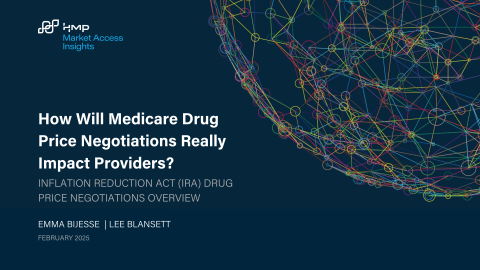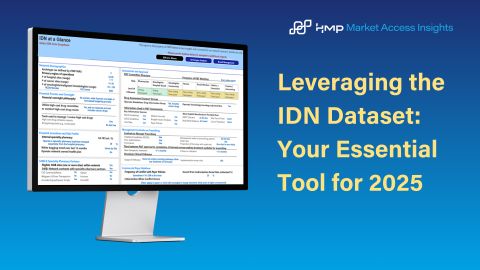

Article
When Do Payer Pathways Matter?
May 21, 2024Authors
Topics
While provider-initiated oncology clinical pathways are regaining momentum, payer pathways struggle to find a foothold in this space. Still, they can exert impact under certain conditions.

In the increasingly complex landscape of oncology treatment, providers and payers alike are looking for ways to better navigate options, optimize patient outcomes, and manage drug utilization. Decades since their introduction, oncology pathways are regaining momentum as tools to guide clinical and value-based decisions.
Manufacturer Concerns
For manufacturers, the key question revolves around the impact of pathways on patient access to specific treatments. With a plethora of clinical and utilization management tools, this impact can be multifaceted and difficult to extract. Simply collecting data on pathway existence or a brand’s pathway position can lead to a false sense of security or misplaced angst for manufacturers. Why?
- Pathways can take on a myriad of system configurations: Provider-developed pathways are often integrated within the electronic health record (EHR), but this is not the case for payer-initiated pathways.
- Participation in payer-initiated pathways is voluntary. Individual payers employ different pathway criteria, with some relying on external development bodies. The assumption that payer pathway preferences and payer policies align is often incorrect.
- Many pathways do not require compliance, nor do they offer financial incentives (“carrots”) or impose penalties (“sticks”) to encourage adherence.
- An oncology pathway is only one tactic in the arsenal of clinical decision support tools for both providers and payers.
Measuring Pathway Impact on Providers’ Treatment Selection
To better understand the impact of pathways, we conducted a primary quantitative study focusing on oncologists’ interaction with pathways and how these interactions influence their treatment selections. Our findings indicate pathways can be an effective tool in guiding oncologists’ treatment selection—but more importantly, some pathways are more consequential than others. In our research, provider-developed pathways emerged as more impactful than payer-initiated ones, underscoring the importance of clinical trust and workflow integration into EHR. In general, provider pathways are viewed by oncologists as clinically sound tools that advance the practices of good medicine. Payer-initiated pathways, in contrast, are perceived as less transparent and more financially focused. Most oncologists only become aware of any payer preferences during the prior authorization phase, when conflicts are raised by their support team. Ironically, the prior authorization teams or support staff can be more knowledgeable “users” of payer policies or pathways than the prescribing oncologists.
When and How Payer Pathways Impact Treatment Selection
Every day, oncologists must navigate between patient needs, personal experience, institutional guidelines, and payer preferences. As such, payer-initiated pathways need to be considered thoughtfully. While individual oncologist preferences and institutional strategies, including provider pathways, often guide treatment decisions, payer pathways can exert some influence, especially in competitive treatment classes. In our research, oncologists indicated that when multiple same-class treatments are viewed as clinically similar, they are likely to switch to the payer-recommended regimen. Despite the lower importance placed on payer pathways (when compared to provider pathways), we found brands on payer pathways still gain notable preference over off-pathway brands. In the instance of cyclin-dependent kinase 4/6 treatments included in our study, the level of gains in oncologists’ preference for on-pathway brands are similar between payer and provider pathways in many simulated scenarios.
Almost all integrated delivery networks and community practices verify payer coverage as a step in the treatment-ordering process. An oncologist may not know whether the payer preference is policy based or pathway based, but the oncologists are conscious of the burden in participating in peer-to-peer appeals. For payer pathways where off-pathway selections require further actions, this administrative burden may be the most effective “stick;” over time, these burdens may shape oncologists’ preferences and lead to “unconscious compliance” that impacts brand utilization.
With an expanding set of tactics targeting clinical consistency and drug utilization, it is important for manufacturers to understand how pathways play into the treatment selection process and understand the conditions under which pathways of any origin exert the most influence. Building on our initial study, our 2024 research effort will further investigate the drivers that may increase pathway influence, the implications of conflicts between provider and payer pathway preferences, and how these implications may differ across a broader set of brands. Manufacturers can then leverage these insights to develop effective approaches to ensure greatest patient access to their treatments.
If your organization is interested in learning more about our proprietary pathway study or any of our provider-focused research, please contact Cindy Chen.
The Latest
Article
Thought Leadership Whitepaper: How Will Medicare Drug Price Negotiations Really Impact Providers?
As manufacturers prepare for Medicare drug price negotiations, a critical question emerges: How will your provider engagement strategy evolve when Maximum Fair Prices (MFP) take effect in 2026?
Emma BijesseArticle
Meet Dan: Researcher, Dad, and Oncology Report Innovator
At HMP Market Access Insights, we’re lucky to have a team of experts dedicated to uncovering meaningful insights in the oncology space. One of those experts is Dan, whose work is shaping how we approach community oncology research.
Daniel BuchenbergerArticle
Leveraging the IDN Dataset: Your Essential Tool for 2025
As IDNs face increasing complexity in oncology management, having a strategic approach backed by actionable insights is critical. Our dataset doesn’t just offer data—it equips your teams with the tools to anticipate challenges and seize opportunities.
Emma Bijesse





